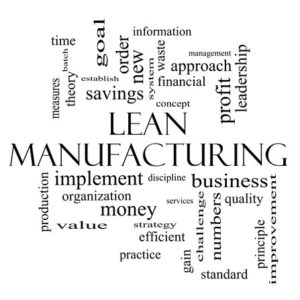
by Admin | Jul 29, 2015 | Manufacturing, Recent Posts |

Lean Manufacturing Word Cloud Concept in black and white with great terms such as quality, discipline, concept and more.
Lean Manufacturing is often associated with a focus on cost reduction. However, through the implementation of lean manufacturing processes, many injection molders also realize reduced lead times, improved on-time delivery scores, and an increase in overall customer satisfaction.
With those types of added benefits, it’s easy to see what many shops are adopting lean principles. But what are 2 things you can do in the short term that will help you get closer to lean. 5S and Kaizen Blitz.
5S refers to five steps, namely Sort, Straighten, Shine, Standardize and Sustain, which are core to laying the foundation for continuous improvement. It is a way to systematically organize workplace to ensure it is safe and efficient.
The 5S organization concept provides an amazing boost to a lean manufacturing program, as it mandates constant checks and repairs of machinery and equipment, and it makes results immediate and notable. The results improve because of availability of required tools, properly labeled materials in their appropriate place, along with a general atmosphere of everything being in right place. There are many injection-molding companies who maximize the benefits of lean manufacturing by adopting the 5S principle.
Kaizen is a practice developed by Masaaki Imai of Japan as a way to continuously improve the workplace to make it more efficient and competitive. The various aspects of Kaizen are tackled by the whole team and involve setting up optimal processes and taking prompt actions to contain as well as resolve the actual causes of issues and problems.
A Kaizen Blitz is a concerted and focused approach to improve processes in an accelerated, expedient way. It is an intensive and rapid improvement where results are noticeable within a few days rather than over a longer period of time. In manufacturing environments, teams work together to come up with structured and creative ways to improve processes and solve problems within a short timescale.
Through the process of Kaizen Blitz, you are picking a specific area of focus. This is an important step towards progress and also gets multiple people across multiple departments and functions involved. However, the process is short yet intense by nature.
Reducing costs, and reducing waste are directly related. The lean manufacturing process can play an integral part in your competitive strategy. By implementing 5S and pursuing rapid improvements through a Kaizen Blitz concept, your shop can make real progress in a short period of time.
The Nanoplas family of products can also play an integral role in your lean approach and can also help you achieve your competitive goals. Through reduced scrap rates, improved maintenance performance and other tangible benefits, our products can make a difference across multiple areas. We invite you to contact us to learn more, and let us show you the Nanoplas difference.
by Admin | Jul 15, 2015 | Manufacturing, Plastics, Recent Posts, Uncategorized |
There is a direct correlation between having a well planned and managed mold maintenance and preventative maintenance program and realizing maximum value from your tooling investments. With the expectation that each and every part must be perfect, and that production speeds will increase, the pressure to have your tooling perform is real.
To maintain the tooling steel to perform consistently, it must have scheduled downtime for inspection, evaluation and diagnostics. It must also be cleaned and prepped using high quality mold cleaners, rust inhibitors and grease (like Nanoplas) to help ensure that mold is ready for production when needed.
In many cases, the mold cleaning and preparation process has been the same for many shops for many, many years, using the exact same products. In some cases, that may be OK, but in many cases, the advances in mold technologies and advances in mold cleaning and maintenance products can have a significant impact in the time and resources required to complete the required processes, allowing for faster change overs and less scrap in getting to acceptable part quality production.
By planning and managing a maintenance program, and evaluating and testing new products and methods for maintenance, shops can often extend the life of their tooling. To learn how Nanoplas products can benefit your injection molding operation, contact us today!
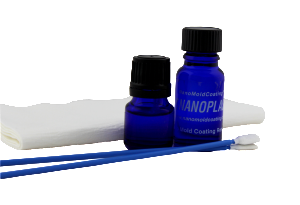
by Admin | Jul 1, 2015 | Manufacturing, Recent Posts |
Rapid Injection Molding, or RIM has really changed the plastic injection molding industry. By offering lower production quantities and quicker turnaround times, it has allowed many products to be molded versus other manufacturing methods.
One of the benefits of RIM is that most manufacturers use or follow the industry standard practices, making it a great predictor of the true manufacturability when the part moves to large-scale production quantities. By allowing for quick turns and lower quantities, buyers are able to fine tune designs and make adjustments without the huge costs of the past.
 One of the ways that injection molders can make RIM even more efficient is to use a product like NanoMoldCoating from Nanoplas. This mold release coating can help with release issues on dies from the simple to the most complex. The specially formulated product uses nanotechnology to create a semi-permanent barrier on mold surfaces allowing for exceptional part release.
One of the ways that injection molders can make RIM even more efficient is to use a product like NanoMoldCoating from Nanoplas. This mold release coating can help with release issues on dies from the simple to the most complex. The specially formulated product uses nanotechnology to create a semi-permanent barrier on mold surfaces allowing for exceptional part release.
The Nanoplas family of products are designed to work together to make your molding operation more efficient and productive. To learn more about how NanoMoldCoating and the entire line of products from Nanoplas, contact us today!
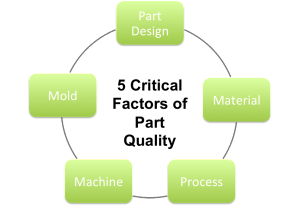
by Admin | Jun 24, 2015 | Manufacturing, Plastics, Recent Posts |
Optimizing The Molding Process

The use of Scientific Molding has had a dramatic impact on the efficiency of molding operations. The following 6 steps should be considered to help optimize the process robustness of your molding operation.
Viscosity Curve
The scientific study of viscosity curve helps show the effect produced by injection speed on viscosity, and it also shows the most consistent region of viscosity. By monitoring this data, it reduces the variation between production lots. The idea of “inject as fast as you need to and not as fast as you can” is directly related to this study, as slower speed are acceptable if allowable.
Cavity Balance Study
This aspect of the process reveals the fill balance between every cavity. It aids in the achievement of better consistency for between cavities. It facilitates studying the % imbalance and provides case-based results.
Pressure Drop Study
This study shows if the process pressure is limited, which can impact consistency. It is recommended to record pressure drop through the nozzle and at the end of fill. Recording pressure drop at other sections is important only in case of pressure-limited processes.
Cosmetic Process Window Study
This reveals the mold’s capability to form parts that are cosmetically acceptable. Technically, a large Cosmetic Process Window is the initial step towards a robust process.
Gate Seal Study
This shows the action of gate seal. It aids shot to shot consistency. However, it is not advisable to perform a Gate Seal Study on a Hot Runner Mold. Also, if the graph doesn’t flatten, it indicates time for the ‘Pack and Hold’ action.
Cooling Time Study
This aspect shows the effect of cooling time on the production. It also improves the cycle efficiency. It is also recommended to perform the study at higher end of mold temperatures.
The uses of advanced concepts in injection molding are increasing at an amazing pace. By utilizing the information from the above 6 steps, progressive molders will be better equipped to improve production efficiencies and increase throughput.
The Nanoplas’ line of injection molding products are engineered to help improve efficiencies and lower scrap rates. To learn more about how they can help your injection molding operation, contact us today!
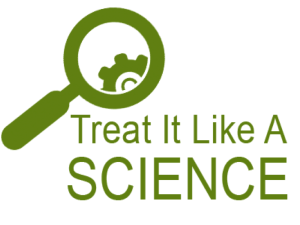
by Admin | Jun 17, 2015 | Manufacturing, Recent Posts |
 Taking Injection Molding To The Next Level
Taking Injection Molding To The Next Level
When an industrial science approach is applied to the molding process, it takes injection molding to a higher level of precision and more importantly, repeatability. It is especially relevant and applicable for complex and critical-use parts.
Scientific basis of injection molding is based on sensors and sophisticated software to monitor every phase of the molding process. It helps engineers and technicians control and adjust critical variables, like flow rate, temperature, cooling temperature, and fill rate. This further helps maintain a precise, repeatable process of production.
Benefits of Using Scientific Molding Technique
The scientific technique of injection molding is highly beneficial during the stage of molding, once the tool has gone through the process of development and debugging. The process helps analyze the fill pack and hold the stages individually.
The sensor data also facilitates a deep and detailed understanding of every stage for the engineering team. This, in turn, helps detect and correct any variations that occur in key parameters, like flow rates, temperature, moisture content and viscosity, in real time, thereby ensuring consistent quality.
Some other benefits associated with use of scientific injection molding are as follows:
- Reduced consumption of material
- Higher yields
- Reliable documentation of every part
- Provides consistent repeatability as well as quality from part to set-up for every production cycle
- Makes the process more optimized to provide best cycle times possible.
- Provides better control over flow without any weld lines or flaws over the surface
By taking a scientific approach to your molding projects, you will be able to track and control critical factors, and through data analysis be better able to manage workflows and production. With products like those in the Nanoplas family of injection mold release coatings, Injection Mold Cleaners, Injection Mold Rust Preventatives and Injection Mold Lubricating Greases, and the data and insight you can gain from taking a scientific approach, the opportunity for increased production efficiencies, lower scrap rates and cost savings is possible.
Contact Nanoplas to learn more about how our products can help your operation achieve its goals.
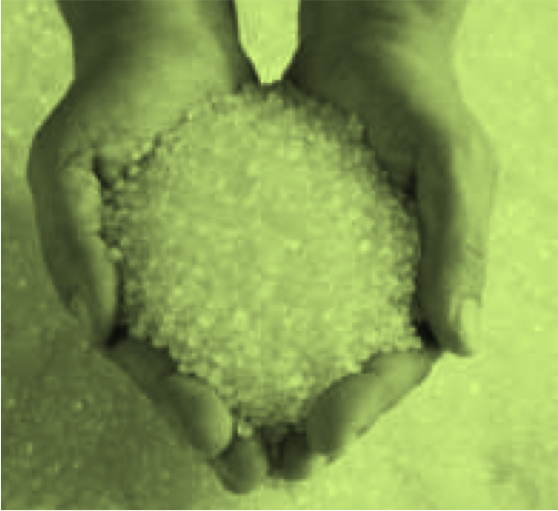
by Admin | Jun 10, 2015 | Manufacturing, Recent Posts |
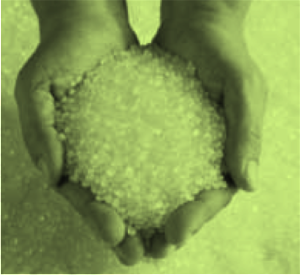 Material selection is one of the most crucial factors when developing an injection mold design. There are a lot of excellent material suppliers offering quality materials for the injection molding process. Many also offer different grades or blends of materials to choose from. However, one wrong decision can have major effects on the production process and the final product.
Material selection is one of the most crucial factors when developing an injection mold design. There are a lot of excellent material suppliers offering quality materials for the injection molding process. Many also offer different grades or blends of materials to choose from. However, one wrong decision can have major effects on the production process and the final product.
Material Selection for Injection Molding
Generally, material selection is dependent on the use of the part being manufactured or fabricated. Although almost every part is unique, there are certain, consistent aspects that you should consider while choosing injection-molding materials. These considerations can help you save both cost and potential headaches for your project.
Some of the most important considerations are as follows:
Raw Material Quantities – Order The Right Amount
Try to order enough material at one time. No one wants to be left with surplus raw material, but you also don’t want to be short or run out in the middle of a production run.
Choose The Right Material
It may seem like an obvious statement, but different types and grades of plastics and polymers have different uses and properties. Be sure that the material you have selected is appropriate and compatible for the use of the end product. The plastic requirements for a medical part may be significantly different than that of a sub assembly component for an automotive application. Considerations like temperature, biological and chemical interactions, food or animal contact and more must be considered.
Minimize Secondary Processes
Minimizing secondary processes like custom inserts, trimming and even pad printing, can help reduce the overall cost of a project. All these processes entail additional costs and setup time. And in many cases can be eliminated based on the end us of the product, or in the initial design of the mold. In some cases, changes in the material used or even the use of different mold release (like Nanoplas’ Nano Mold Coating) can help reduce or eliminate the need for some secondary processes or a tooling modification.
Mold Design
This is truly an art and science in and of itself. The design of your mold can have significant impact on the materials that can be used, the secondary processes that will be required and the final appearance of the part, to name just a few.
Material selection is complex process. It’s important to select materials that meet the specifications and the end use while also taking into account cost, design and service conditions. It is also imperative to follow the material manufacturers’ data sheets and performance matrix.
One aspect of material selection that is often overlooked is how the mold maintenance and mold release products that are used can impact the materials selected. The ability to mold through a rust preventative or grease without bleeding or the ability to use an existing tool without modification because of a new mold release technology can save time, cost and hassle.
To learn more about how the integrated family of Nanoplas products can help reduce scrap, increase production efficiencies and save time for your injection molding operation, contact us today!







